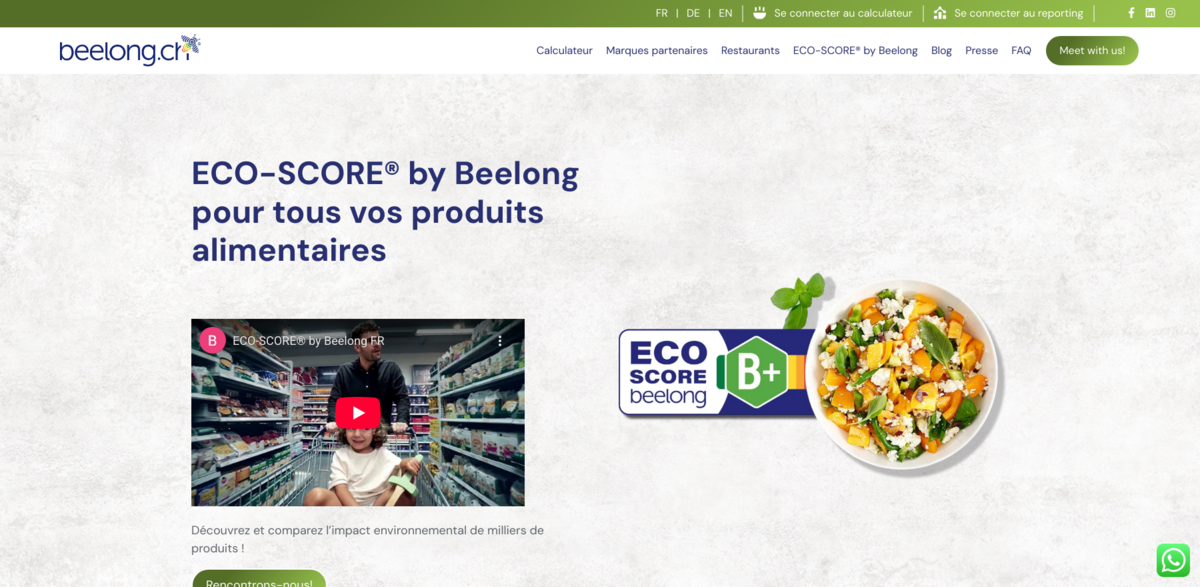What is ECO-SCORE® BY BEELONG?
ECO-SCORE® by Beelong is a unique project designed to report the environmental impact of food products relative to their energy content (Kcal) instead of their weight (Kg). This approach, which may seem a bit unusual at first glance, allows for a more relevant comparison between various categories of products. The idea here is to guide food consumption so that consumers can eat in an eco-responsible manner while satisfying their hunger. In essence, the project enables brands, distributors, restaurateurs, and collective restaurants to communicate their environmental transparency, highlight good practices, and simplify choices for customers thanks to a method that underscores both nutritional and environmental facts… a practical solution for today’s market.
Main Benefits at a Glance
Key features and facts of ECO-SCORE® by Beelong include:
- Evaluation based on kilocalories, leading to a relevant comparison between differing product categories.
- Alignment with guidelines from the Food and Agriculture Organization (FAO), focusing on food security and sustainable development.
- Comprehensive analysis of each ingredient using criteria like CO2 emissions, water usage, soil impact, biodiversity, endangered species, and animal welfare.
- Inclusion of additional criteria such as the impact of packaging and the sustainability policy of the processing company.
- Incorporation of the geographical journey of ingredients—from the country of agricultural production to elaboration and finally, consumption.
Analyzing the Environmental Impact
Normally, the environmental impact of a food product is expressed in relation to its weight. However, ECO-SCORE® by Beelong takes a fresh path by comparing the impact in relation to energy content. Essentially, rather than focusing solely on weight, this method reflects the true purpose of food—to nourish the population. This unique measurement provides a level playing field, enabling comparisons that truly matter. It is a blend of transparency and practicality… conveying messages that resonate with sustainability goals while keeping things straightforward.
Evaluating Ingredients and Composition
At the heart of this analysis lies the composition of the product. Each ingredient is meticulously evaluated, beginning with its declaration and percentage in the final product. The assessment covers several crucial criteria such as CO2 emissions, water consumption, soil impact, biodiversity concerns, endangered species protection, and animal welfare. This approach ensures that even the smallest detail is accounted for. The evaluation doesn’t stop at the ingredient level – once the ingredient data is compiled, further criteria related to the finished product, such as the environmental impact of packaging and the sustainability policies of the processing companies, are also factored in. It’s a holistic process that leaves no stone unturned.
Assessing Geographic and Economic Impact
Besides the product’s internal composition, ECO-SCORE® by Beelong connects the environmental impact to geography. It considers the distances traveled by all the ingredients before they merge into the finished product. The analysis takes into account the country of origin of each raw ingredient, the country where the product is elaborated, and even the country where it is finally consumed. This geographical perspective emphasizes that not only does the composition matter, but so does the journey of each component. Such detail plays a crucial role in an increasingly globalized food market, where long supply chains can sometimes obscure the real environmental cost, and these factors are now brought front and center.
Integrating Sustainability With Culinary Art
The impact of ECO-SCORE® extends seamlessly into the culinary world and food service sectors. For restaurateurs looking to create recipes and menus, the platform offers an easy way to generate eco-friendly meals based on real, tangible product data. It’s all about enabling chefs to calculate both the environmental and nutritional impact of their menus, then sharing this information transparently with diners. Meanwhile, collective restaurants can measure and compare the environmental footprint of their food purchases, obtain actionable recommendations, and communicate their commitment to sustainable food practices… making the journey towards sustainability a practical reality for everyone involved.
Project Impact on SDGs
- SDG 2: Zero Hunger – By promoting food security with a focus on nutritional value and sustainable consumption.
- SDG 12: Responsible Consumption and Production – Via transparent reporting that motivates brands and distributors to adopt environmentally friendly practices.
- SDG 13: Climate Action – Through the reduction of carbon footprints by comparing products on an energy-content basis.
- SDG 15: Life on Land – By considering the impacts on biodiversity, soil, and ecosystems in the evaluation process.
Looking Ahead to Sustainable Consumption
ECO-SCORE® by Beelong is more than a numerical score—it represents a philosophical shift in how food products are evaluated and consumed. The project’s dynamic framework allows brands, restaurateurs, and collective restaurants to embrace an eco-responsible approach, where every food purchase is a step toward sustainability. By recalibrating the focus from weight-based assessments to energy-content comparisons, ECO-SCORE® offers a nuanced, comprehensive view of a product’s environmental impact. This new perspective helps to underscore the interconnectedness of environmental accountability and food security, a critical consideration in today’s interconnected world. It’s a testament to the power of transparency and rigorous evaluation in inspiring sustainable practices, providing consumers with clear, actionable information and paving the way for a greener future… one bite at a time.


















